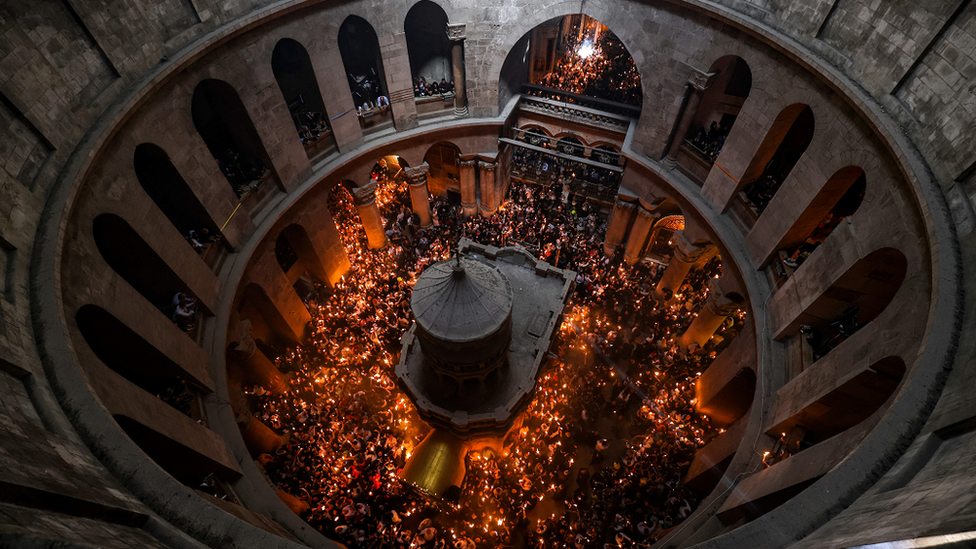Holy Fire celebrated by Christians in Jerusalem amid Israeli police restrictions
- Published

The Church of the Holy Sepulchre - the site of the Holy Fire ritual
Thousands of Christians filled Jerusalem's Old City on Saturday for an important Orthodox Easter ritual, despite restrictions by Israeli police.
The Holy Fire ceremony drew huge crowds to the Church of the Holy Sepulchre, in occupied East Jerusalem, where Israeli Police control security.
It sits on the site where Christians believe Jesus was crucified and buried.
Police had limited attendance to 1,800 people inside and 1,200 outside, citing safety reasons.
Church leaders urged Christians to ignore restrictions and criticised the police presence at the event.
The Holy Fire ritual can be traced back centuries and typically takes place amid packed crowds in the holiest site in Christianity. Christian pilgrims from around the world travel for the ceremony, which symbolises Jesus's resurrection.
Ethiopian Orthodox Christian pilgrims at the ceremony
Christian pilgrims from around the world attended the ceremony
After hours of anticipation on Saturday, the Greek Orthodox Patriarch emerged from the sealed empty tomb with a lighted candle - an act considered an annual miracle before Orthodox Easter Sunday.
The flames were passed from person to person around the church and with both local Christians and foreign pilgrims who were waiting in the narrow streets nearby.
Orthodox Christians lighting their candles during the Holy Fire ritual
In previous years, as many as 10,000 worshippers packed into the church, with many more crowding into the surrounding alleyways of the Old City.
But for the second year running, church leaders were told that access would be considerably restricted over safety concerns.
"We have also sat with external engineers who have told us there is a limit to the crowd size that is allowed inside of the church and due to these statements by the engineers we are limiting the crowds," police spokesperson Master Sergeant Dean Elsdunne said previously.
Churches reject the claim that restrictions were needed.
Many more packed the surrounding alleyways
Thousands were also reportedly unable to reach the church on Saturday after Israeli police set up checkpoints at the entrance and across the walled Old City.
The churches say the restrictions are part of long-standing efforts to push out the local Christian community.
They say local Christians have faced increased harassment and violence in recent months in the occupied East of the city, and claim that extremists have become emboldened by the rise of the Israeli far-right.
Related topics
- Published12 April 2023
- Published15 April 2023